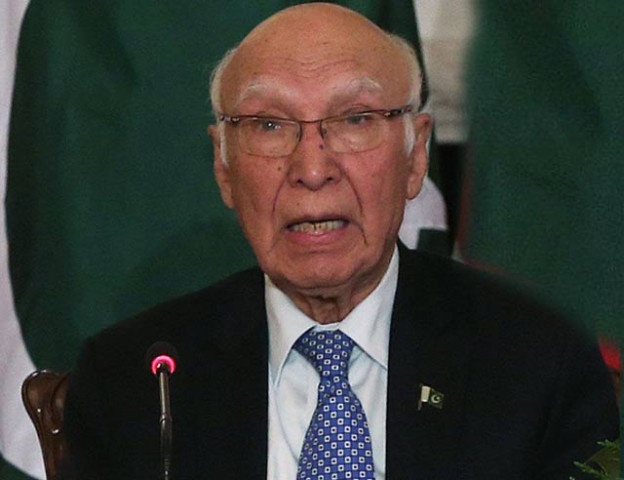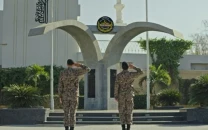Afghan Taliban leadership is in Pakistan, admits Aziz
Admission by Aziz comes after years of official denials that Pakistan offers shelter or exerts influence over Taliban

PHOTO: AFP
The admission by Sartaj Aziz comes after years of official denials by Islamabad that it offers shelter or exerts any influence over the Taliban, whose 14-year-insurgency against Afghan and NATO forces has claimed tens of thousands of civilian and military lives.
Pakistan not to blame for Afghan troubles, Aziz says on US visit
Speaking at the Council on Foreign Affairs in Washington on Tuesday, he said: "We have some influence on them because their leadership is in Pakistan and they get some medical facilities, their families are here."
"So we can use those levers to pressurise them to say: 'Come to the table'," he added, according to a transcript on the think tank's website.
The remarks confirm what has become an open secret in diplomatic circles, particularly since Pakistan began brokering direct peace talks between Kabul and the Taliban last summer. The negotiations faltered after Afghan intelligence leaked the news the group's founder Mullah Omar had died in 2013.
The Taliban later confirmed they lied about Omar's death for two years, sowing divisions among the militants and anger at his successor Mullah Akhtar Mansour for leading the cover-up.
Kabul amenable to all but one Taliban demand
Most of the group's leaders are believed to be residing in the southwestern city of Quetta with others in northwest Peshawar and southern Karachi.
Pakistan, Afghanistan, the United States and China held their fourth round of talks aimed at reviving direct peace talks between Kabul and the Taliban late last month.
The four-country group invited Taliban representatives to return to negotiations by the first week of March, though a spokesperson for the militants later said they had not yet received an invitation.
Aziz said Islamabad had used the threat of expulsion to force the Taliban into the first round of talks.
"We already -- before the 7th July meeting last year -- we had to use some of these levers and restricted their movements, restricted their access to hospital and other facilities, and threatened them that if you do not come forward and talk, then obviously we will at least expel you," he said.
Afghan Taliban fleeing Pakistan after govt warning, says senior official
Aziz Pakistan's role was as a "facilitator" and it was up to Kabul to make negotiations fruitful.
"We are not the actual negotiators. So I hope as we go along our sincerity in this task will be recognised, and with the hope that Afghan government will play a more active role for the success of these talks."



















COMMENTS
Comments are moderated and generally will be posted if they are on-topic and not abusive.
For more information, please see our Comments FAQ